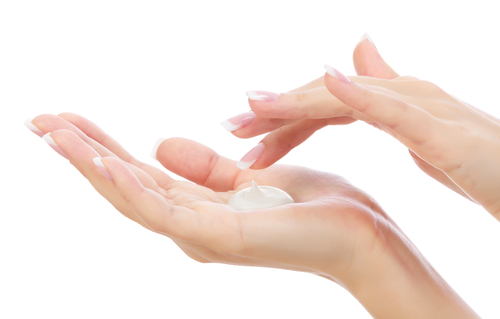Short answer
Yes, some lotion is very bad for you. Before buying or applying, read the label and avoid these ingredients: parabens, fragrance, sulfates and oxybenzone.
Long answer
Most of us use face or body lotion to nourish and soothe the skin. With each application, we assume we’re taking a proactive step forward in personal well-being. However, there are many different types of lotion—and some contain ingredients that actually do more harm to your body than good.
First, it’s important to understand that labels like “natural,” “organic,” and even “dermatologist-recommended” in no way guarantee that the lotion in question is safe. Most of the time, these titles are nothing more than a marketing spin; companies simply use these them to cover questionable ingredients in their products.
So how can you avoid potentially dangerous ingredients in your lotions and moisturizers? First and foremost: read the ingredients. Disregard anything that says “naturally derived,” as this is just a fancy way of stating that the additive has undergone a chemical manufacturing process to reach its final state. Second, avoid any of the following four ingredients: parabens, fragrance, sulfates and oxybenzone.
Parabens are synthetic preservatives designed to prolong the lotion’s lifespan. However, they can potentially do serious damage to the human body over time. Numerous studies have revealed that the same types of parabens are found in the tumors of cancer patients. Another 2006 CDC study revealed that parabens were present in almost all of the urine samples collected from 2,500 adults.
You should also avoid scented or perfumed lotions. This is because fragrance is considered an industry trade secret; manufacturers do not have to legally disclose the ingredients that go into it. On the package, “fragrance” may be listed as a single ingredient, but it is an umbrella term that encompasses thousands of different man-made chemicals. Some of these chemicals may be harmless, but others could cause skin irritation or interfere with hormone production while others are downright toxic.
Sulfates are a known carcinogen, so look out for sodium laureth and/or lauryl sulfate. This ingredient is usually used as a foaming agent, and thus more commonly found in shampoos, cleansers, and detergents. And even though sulfates actually dry out your skin, they are sometimes snuck into lightweight lotions or moisturizing body washes.
As you know, protecting your skin from UVA/UVB rays is imperative to living a long, healthy life. But be careful if you’re relying on your lotion’s built-in moisturizer to do the job. Oxybenzone is a widely used petrochemical that is added to some sunscreens. It’s supposed to absorb UVA rays... however, oxybenzone has also been linked to the release of harmful compounds which may actually increase your risk of skin cancer. Instead, you should seek out mineral sunscreens that use zinc or titanium to protect your skin from sun damage. These ingredients physically block the absorption of damaging rays without harming your body.
Possible short-term side effects
- skin irritation/discomfort
- dry skin
- allergic reactions
Possible long-term side effects
- tumors (linked to parabens)
- hormone disruption
- skin cancer (linked to oxybenzone)
Ingredients to be aware of
- parabens
- fragrance
- sulfates (sodium laureth, lauryl sulfate)
- oxybenzone

Benefits
- hydrates skin
- replenishes dry patches
- soothes calluses
- improves texture/appearance of skin
 Approved by
Approved by 















